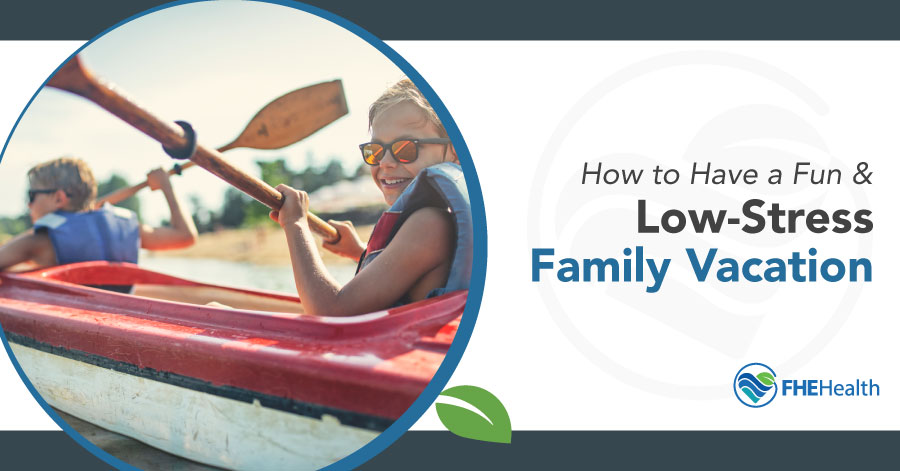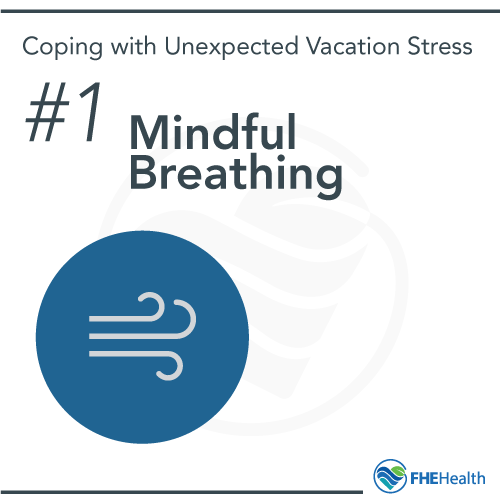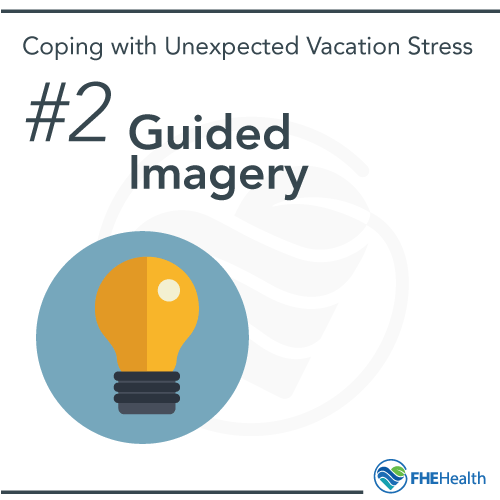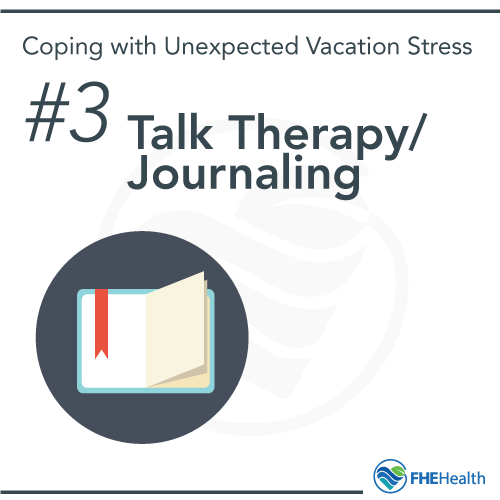
Internet advertisements for hotels, beaches, and amusement parks show families laughing and enjoying their time together. They show smiling parents lounging on a sunny beach while kids play in the sand and ocean. They show happy parents and their kids on amusement park rides or meeting Mickey Mouse at Disneyland.
We know this isn’t the whole story. Real-life often involves dealing with one stressor after another, whether it’s small (like finding a button missing on your only clean shirt) or more serious, like coping with financial or relationship issues.
Common stressful events experienced by families on vacation include spending too much money, waiting until the last minute to pack, and booking hotel rooms too small to accommodate their family properly. Additionally, unexpected problems may arise during vacations that you may not have any control over: spats between siblings turning into a week-long feud, weather-related stress (too cold to swim, too hot to do anything outside) or leaving for vacation with unresolved problems percolating between you and your spouse.
Coping with Unexpected Vacation Stress
Mindful Breathing
 The next time you feel stressed, take a moment to focus on how you’re breathing. Fear, panic and stress force you to take shallow, rapid breaths because muscles involved in breathing have tensed up. Although breathing rapidly gets blood to your muscles faster by doubling your heart rate, it indirectly worsens feelings of stress and anxiety.
The next time you feel stressed, take a moment to focus on how you’re breathing. Fear, panic and stress force you to take shallow, rapid breaths because muscles involved in breathing have tensed up. Although breathing rapidly gets blood to your muscles faster by doubling your heart rate, it indirectly worsens feelings of stress and anxiety.
Inhaling deeply, slowly and rhythmically is an instant stress-buster. Mindful breathing, or simply focusing solely on breathing, expands airways, relaxes chest muscles and inhibits the release of cortisol into your bloodstream. Try mindful breathing exercises to help control stress during a family vacation.
Guided Imagery
 Similar to meditation, guided imagery involves thinking about experiences or places that are calming and soothing to you. Remove yourself from a stressful situation as soon as you can, find a quiet place away from others and focus on whatever makes you feel calmer and more in control of what is happening around you. This technique requires practice and is something you should do before you’re in a crisis. Recognize the things that bring you back to your center, the things that remind you of who you are and bring you joy. When you have these things memorized, it will be easier to focus on them when you need to in moments of stress.
Similar to meditation, guided imagery involves thinking about experiences or places that are calming and soothing to you. Remove yourself from a stressful situation as soon as you can, find a quiet place away from others and focus on whatever makes you feel calmer and more in control of what is happening around you. This technique requires practice and is something you should do before you’re in a crisis. Recognize the things that bring you back to your center, the things that remind you of who you are and bring you joy. When you have these things memorized, it will be easier to focus on them when you need to in moments of stress.
Talk Therapy/Journaling
 Humans thrive on social interaction and communicating with each other. Writing down what’s bothering you or talking to a trusted family member or friend is a great way to help you cope with stress while on vacation. People who are depressed often tell their therapist that if they had someone they could talk to about their thoughts and feelings, they might not feel so depressed and alone.
Humans thrive on social interaction and communicating with each other. Writing down what’s bothering you or talking to a trusted family member or friend is a great way to help you cope with stress while on vacation. People who are depressed often tell their therapist that if they had someone they could talk to about their thoughts and feelings, they might not feel so depressed and alone.
10 Ways to Proactively Lower Vacation Stress
It’s always a good idea to prepare for stressful situations. When you let stress catch you off-guard, you’ll be less equipped to handle it in a healthy, productive way.
This is doubly true on a family vacation. In a normal situation, stress that affects a family can be dealt with in familiar ways — discussing disputes with a therapist or spending some time away from one another, with each of the parties involved being able to take advantage of having some space to themselves.
On vacation, you may not have this luxury. You may be in small hotel room with limited options to be alone. In an unfamiliar location, you’ll be distanced from your normal stress relief options. Here are 10 ways to de-stress your vacation and increase the chance of making enjoyable memories with people you care about:
1. Take Advantage of a Travel Agent
Planning a vacation can take hours of research and more hours making reservations, checking hotel reviews and gathering necessary documents if you’re leaving the United States. Travel agents can do all the grunt work and save you money on hotel/location packages.
2. Splurge a Bit on Larger Hotel Rooms
While you might be thrilled about saving money on cheaper, smaller rooms, packing your family into a small hotel room increases stress and squabbling. In addition to protecting their personal space, everybody needs a certain level of privacy. Spending several days together in one cramped hotel room may be a primary factor in ruining a vacation.
3. Don’t Try To Cram Everything Into One Day
If you have a strict time limit for your family vacation and plan to visit a large venue like Disneyland or Six Flags, reconsider your choice of destination or plan the vacation when you have plenty of time. Trying to cram in three days’ worth of stuff into one exhausting 12-hour day is a sure way to doom a family vacation.
4. Start Packing a Few Days Ahead of Your Vacation
Packing the night before may cause you to underpack or overpack because you’re in a hurry and haven’t had a chance to recheck what you’re taking. The main item you don’t want to forget is prescription medication. Also, make sure you have enough medication to last you over your vacation.
5. Check the Weather Forecast for Your Destination
Is it going to rain or snow? Is a hurricane expected to make landfall? Knowing what kind of weather will impact your vacation is also essential to making family time as enjoyable as possible. Although we all know how notoriously wrong weather forecasters can be, you should still check the extended forecast for the place you’re heading to.
6. Examine Directions Beforehand If You’re Driving to Your Vacation Spot
Waiting to dig the map out of the glove compartment when you’re hopelessly lost is not a good way to keep stress at a minimum during your family vacation. If you don’t have a GPS system, take the time to write down directions on a piece of paper.
7. Give a Family Member or Friend the Key to Your Home
You don’t want to be anxiously wondering if you left the stove on, the pipes froze and burst or someone broke into your home while you’re on vacation. So ask someone you trust to check your home at least once a day while you and your family are away. Peace of mind adds greatly to your vacation enjoyment.
8. Make Activity Planning a Collaborative Process
It can be difficult to resist planning an entire trip on your own, but this may not be conducive to avoiding conflict and the resulting stress. Put yourself in the shoes of your family members. Would you want to go on a family vacation you didn’t have any say in?
Even if your spouse, children or other loved ones don’t complain to you directly, they may resent that they weren’t given the chance to choose some group activities. This makes conflict more likely to bubble up.
9. Find Some Alone Time
Going on a trip together as a family doesn’t mean it’s not okay to split up for periods of time. Something as simple as going for a run in the morning on your own or taking an hour to read in peace while the rest of the family is out doing something else can give you (and the other members of the family) time to decompress.
10. Opt for a Trip Somewhere Peaceful
When you’re planning a trip, it’s understandable to want to take the kids to an amusement park or try to explore an entire city in a week. While this can be rewarding and enjoyable, there’s also high potential for added stress.
Family vacations are also a great time for relaxation: Find a campsite or cabin with hiking trails, rivers and lakes nearby, bring books, puzzles and games for the kids and remember how to relax for a few days, even if it’s just to recharge between trips.
Vacationing with Someone Who Suffers from Addiction or a Mental Health Issue
Recovering from addiction or coping with a mental illness is difficult enough without being confronted with additional stress. How the body responds to stress plays an influential role in the development of substance addiction and mental illness. Stress-related brain chemicals such as serotonin, cortisol and dopamine activate a physiological system called the HPA axis. Addiction scientists think this plays a major role in exacerbating cravings during recovery or worsening a mental health problem in people dealing with psychological problems.
If you plan to take a vacation with someone who is dealing with mental health issues and/or recovery from addiction, be aware of how stress acutely affects these individuals. Inform the person that you want them to tell you if something or someone is causing them to feel anxious. Let that person know you understand how difficult it can be to cope with stress and that you will do everything possible to help them deal with unexpected problems interfering with their recovery or mental illness.
Living With Low Stress, Courtesy of FHE Health
At FHE Health, we understand that stress can be a seemingly minor issue with some major consequences as it becomes more and more severe. We treat people with serious mental and behavioral conditions, but we also want everyone to have access to the tools they need to prevent things from getting to the point that they feel they need to seek treatment. To learn more, contact us today.






